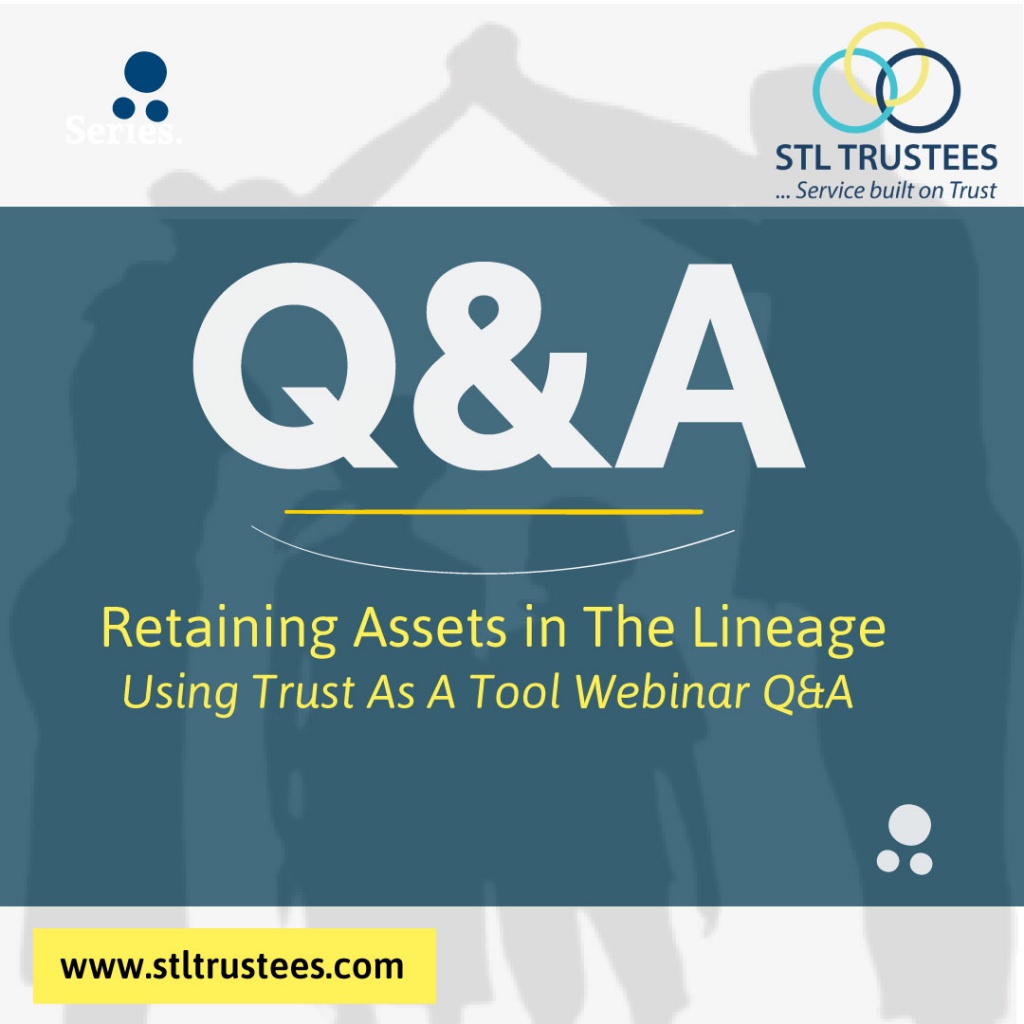Retaining Assets In The Lineage Using Trust As A Tool
– Q & A Session –
Question: Can I create a “Trust” within a “Will”?
Answer: It is possible to create a Trust within a Will. This is referred to as Testamentary Trust and it takes effect upon the coming into effect of a Will. A Testamentary Trust is a Trust where the Testator, rather than dispose his assets to his heirs and other beneficiaries in his Will, transfers it to a Trustee who then administers the assets for the benefit of those named in the Will.
Question: When you set up a Trust can you still enjoy the benefit during your lifetime?
Answer: Yes, the person who sets up a Trust can be a beneficiary of the Trust. This is referred to as a Living Trust. A Living Trust makes provision for the maintenance of the Settlor and any named Beneficiary either at the same time or can be drafted to state that the Trust shall maintain the Settlor and upon his death the proceeds from the assets are to be applied towards the maintenance of named individuals.
Question: Does the Bank grant the Trustee access to savings in the event of death without probate?
Answer: No, essentially you would be required to produce a grant of Probate (with a Will) or Letters of Administration (without a Will) before you can be granted access to the account of a deceased account holder. There is however a law in Lagos known as the Small Estates Law, which provides that where the assets of the deceased account holder consist of only cash and is not more than N100,000 then you can apply for a certificate which you take to the bank and the bank upon presentation to them of that certificate will grant you access to the account.
You may also use the instrumentality of Joint Accounts with the Corporate Trustee so that when the first account holder becomes deceased, the account devolves to the second holder (The Corporate Trustee) by means of a principle of law known as “jus accrescendi”
Question: In the Igbo man example you gave, do you prepare (a Will) even if the properties are situated in Lagos?
Answer: You can prepare a single Will to cover properties everywhere in Nigeria, in the case of the Igbo man, he can write one Will to cover his landed properties in Lagos and “Arondizuogu” in Imo State. After the Will is lodged in the probate registry in the jurisdiction of his choice, a copy of the same Will would be taken to the Probate Registries of the other jurisdictions where the rest of his landed properties are located, for resealing. What is important when making a Will is the “lex situs” i.e, the customary and inheritance law of the place where the property is located.
For instance, in some States in Nigeria, the customary law recognizes that family property can only devolve to male children of the family so that where a property is devised to a female child in a Will, that gift by virtue of that law will be invalid.
Question: How do you apply Trust when you have family-owned assets from before the existence of Nigeria and we now want to formalize everything so that it is in perpetuity for the family generations to come?
Answer: This means that the land has been in the family before the existence of Nigeria. In that case it is clearly a family land and belongs to every generation both born and unborn of that family. Where the Family wishes to formalize the ownership in a Trust it needs to get the consent of every member of the family who will come together to decide that the property be put in a Trust for the entire family. A Deed of Family arrangement could be drawn up in this regard and the Trust devised under same.
Question: Please what is the cost for setting up and administration of a Trust?
Answer: This would depend on several factors including the composition of the assets and the location of landed property, where there are any.
Question: What is cheaper a Trust or Will?
Answer: A Trust is cheaper in the long run because it helps to avoid probate tax which is assessed on the entire estate of a deceased person’s Will. The assets in the Will may include both land /real property and liquid assets (i.e., cash, shares and other certificates). In a Trust, statutory perfection cost is incurred to transfer only the landed property components of the assets.
Question: How can you pass your interests in a company to your Beneficiary?
Answer: Typically, interests in a company are expressed as Shares in that company. A Testator wishing to transfer his interests to his Beneficiaries can do so by making a provision in his Will that those Shares, in the event of his death should be distributed amongst his children and/or other Beneficiaries.
Additionally, the Testator, during his lifetime can also appoint Trustees to be his Nominees and transfer the Shares or even hold same jointly with the Trustees. In this case, the Trustee will be listed in the Register of that company as a holder of those Shares whilst a Trust Deed will prescribe how the Trustee is to distribute income therefrom to the Beneficiaries.
Question: Please how do we legally transfer real property to the Trustees in a Living Trust in view of the laws in Nigeria that only vests legal interest in real estate upon the procurement of Governor’s consent and registration of the deed f assignment. This is bearing in mind that a Living Trust only becomes irrevocable upon the death of the Settlor?
Answer: For a Trust to be duly constituted, title in the Settlor’s real property must be transferred to the Trustee. This means that not only must the property be transferred to the Trustee, but the transfer must be duly registered in the same manner as other conveyance of the property at the relevant lands registry.
An alternative means that can be adopted is for the Trustee to set up a Special Purpose Vehicle company (SPV) in which it holds all the shares. The property can then be transferred to that SPV. This would ease the eventual transfer of the said property to the Settlor’s named Beneficiaries, as what is only required is for the Shares of the SPV to be transferred to the Beneficiaries.
Question: For mortgaged properties, will Trust protect the beneficiaries from the mortgage lenders?
Answer: No and the simple reason for this is that a mortgage is technically a conveyance of that property from the owner to the mortgagee, subject of course to the owner’s equity of redemption which is his right to have the property reconveyed to him once he has discharged his debt obligations to the mortgagee, who for the time being becomes the legal owner of the property even though the mortgagor retains right of usufruct and other proprietary rights.
These rights notwithstanding, the property, as long as it remains under a mortgage, does not form part of the assets of the mortgagor and as such, he cannot create a Trust over such property as this would amount to creating a Trust over property that did not belong to him at the time of the creation of the Trust. This is so even if the assets later revert to him after repayment of his debts to the mortgagee.
Question: Does a Trust need to be registered, particularly a Trust in respect of land?
Answer: Yes, if the Settlor wants to vest the title fully in the Trustee, then it goes without saying that this must be done to achieve the objectives of the Trust.
Question: In the utilization of charitable Trust to preserve generational wealth, can the beneficiaries be only your children, what are the recommendations on how the Trust can be drafted to achieve the objective?
Answer: There are various types of Trusts and each one has different objectives. To this extent a Charitable Trust is quite different and have different objectives from other Trusts. A Charitable Trust is usually set up to benefit a defined category of persons and of a larger group. Whilst your children may be Beneficiaries under a Charitable Trust, if they fit the criterion for all other Beneficiaries, they cannot however be the only Beneficiaries to a Charitable Trust for the reason that once the Charitable Trust limits the Beneficiaries to only your Children, then it does not qualify as a Charitable Trust anymore and must be construed as a regular Trust.
Question: Does a subsequent marriage affect an existing Trust like it does a Will?
Answer: No. The provisions of a Trust are not affected by a change in status of either the Settlor or the Beneficiaries and this includes subsequent marriage of either the Settlor themselves or a Beneficiary. The reason for this is that a Trust is guided strictly by the provisions of the Trust Deed and the rules of Equity. Any changes to a Trust can only be done by the Settlor or where he/she is deceased, by the Beneficiary(ies) or the Guardian ad litem (this must be clearly stipulated in the Trust Deed)
Question: Is a Trust foolproof in ensuring the preservation of assets?
Answer: A well created Trust can to a large extent serve as a foolproof means of preserving assets however this would be subject to the rules governing Trusts as well as the extant laws of the place where the Trust was created and is to be administered.
Question; Can property be transferred to a Beneficiary in a Living Trust, will it be legal as opposed to a gift in a Will?
Answer: A Trust is another means by which a property owner can dispose of his assets to his Beneficiaries and the transfer is a valid and legal means of transferring assets. However, for the title to be vested properly in the Beneficiary, same must be duly perfected at the appropriate Land Registry of the State in which the property is situate in accordance with Section 22 of the Land Use Act.
Question: Can separate Trusts be created solely for the purpose of how the Settlor should be taken care of in case of incapacity or how decisions should be taken for instance funeral arrangements.
Answer: Yes, one can create a Trust the sole purpose of which is to cater to the Settlor especially when said Settlor becomes incapacitated either by reason of age or illness. In fact, this is the main basis of a Living Trust, which is an arrangement where one transfers his or her assets to another person for the purpose of the latter managing same on the owner’s behalf with the proceeds going to the Settlor either exclusively or in conjunction with other persons.




